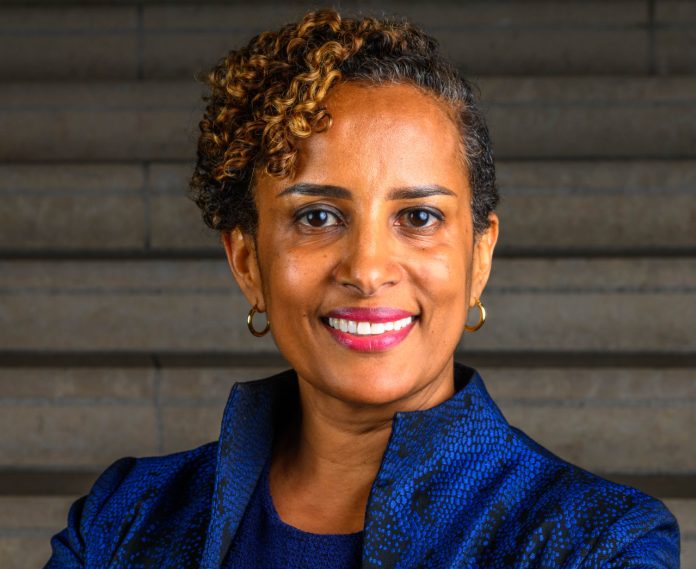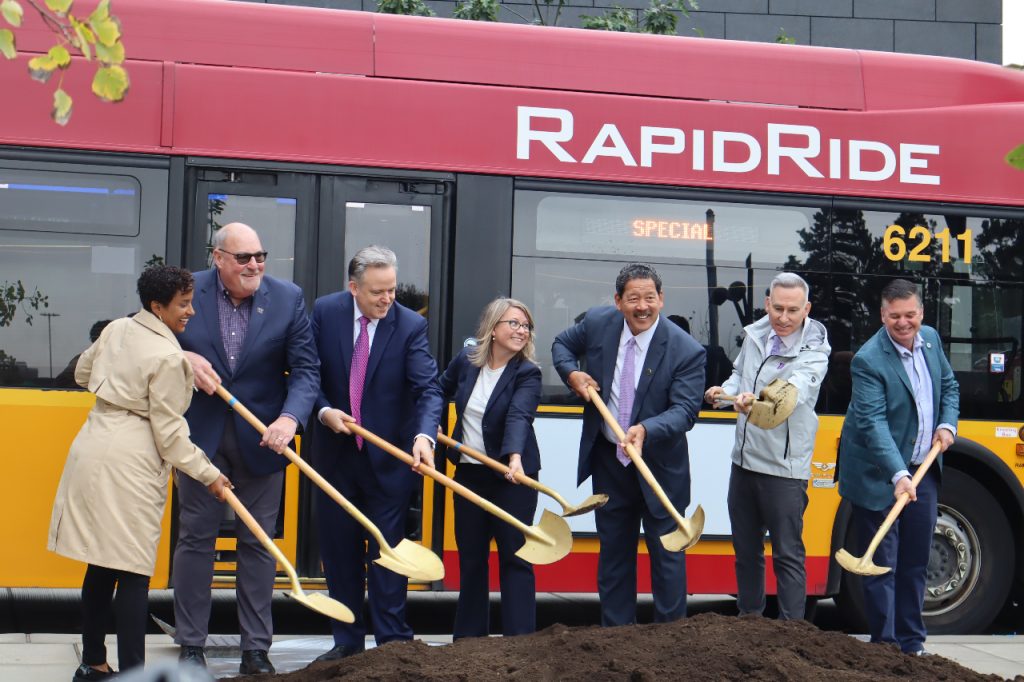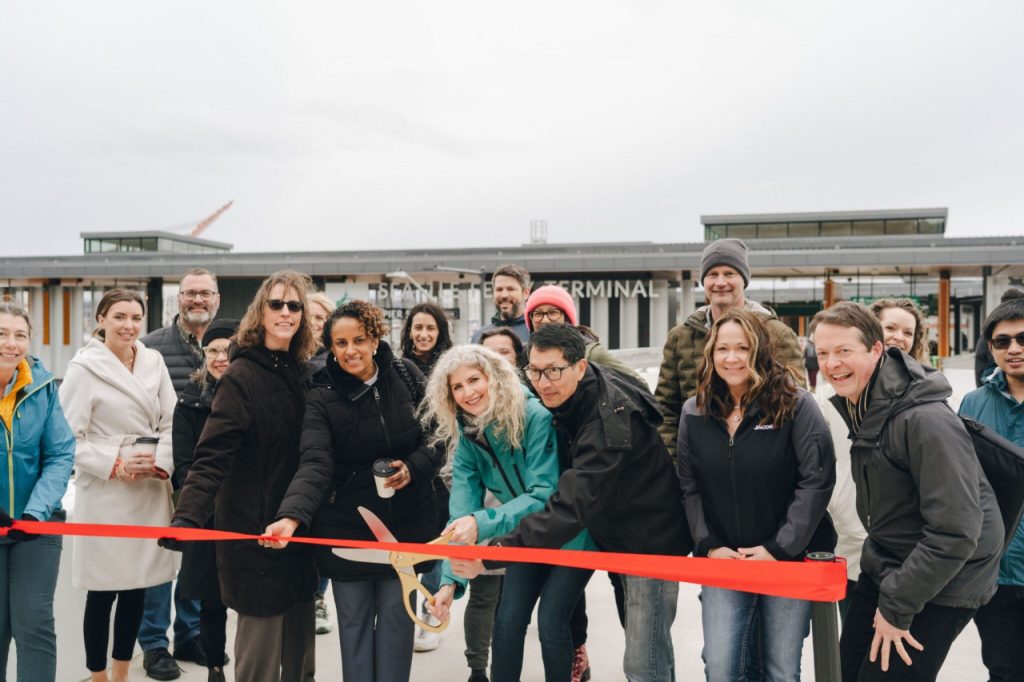
Adiam Emery, one of Mayor Bruce Harrell’s deputy mayors, has been tapped to run the Seattle Department of Transportation (SDOT) following the departure of the department’s current head, Greg Spotts. Emery, who joined the Mayor’s Office in 2022 as chief equity officer, previously served as the head of SDOT’s traffic operations division, the arm of the department most involved with projects aimed at improving traffic flow and managing congestion.
Emery was heavily involved in the development of the newly approved eight-year, $1.55 billion Seattle Transportation Levy that pivots the city away from ambitious goals around transforming mobility and toward a focus on repairing and maintaining the city’s roads and bridges. She was also a driving force behind the establishment of SDOT’s Transportation Equity Framework.
Spotts, who joined the department in 2022 and was hired as a Los Angeles resident, cited a desire to spend more time with family in his choice to leave the department. He’ll leave behind a legacy of social media posts touting the work that SDOT has accomplished as it wrapped up the $930 million Move Seattle Levy approved in 2015 under Mayor Ed Murray.
While Emery is said to be filling the department head role in an interim capacity, Harrell’s office confirms that she is being considered as a potential long-term pick.
“[Deputy Mayor] Emery will be hitting the ground running as interim director to implement the transportation levy and bring stability to the department,” spokesperson Callie Craighead told The Urbanist. “Later this year, after she has an opportunity to become established as interim director, we will decide whether to seek Council confirmation or launch a national search.”
That timeline to be considered for the permanent position would align with Bruce Harrell’s reelection campaign, as he looks to break a long streak of one-term Mayors in Seattle. So far, he has not attracted any real opposition in advance of this August’s primary election.

As Traffic Operations Director, Emery was best known for work to upgrade traffic signals along Mercer Street in South Lake Union. Thanks to so-called “adaptive signals”, the department was able to increase vehicle throughput using technology that responds to existing conditions and holds traffic lights when necessary. But that technology, which hadn’t been tried out anywhere in the city prior to its activation along Mercer in 2017, quickly attracted attention for skipping pedestrian cycles and producing long waits for people trying to cross the street.
Since that time, adaptive signals have been expanded to other areas of the city, including in the University District and the Denny Way corridor. Under the new levy, $100 million will be invested in signal upgrades, an expenditure that seems to have Emery’s fingerprints on it.
Emery has also been involved in some of the more controversial episodes of Harrell’s term so far, including being the point person between the Mayor’s Office and a Harrell campaign donor to discuss adding a potential playground at Denny-Blaine Park, a move widely seen as an attempt to disrupt a well-known LGBT-friendly nude beach. After reporting by KUOW and others shone light on the episode, the proposal was dropped. Emery has also been involved in discussions over the future of Lake Washington Boulevard, stepping in last year when a Seattle Parks employee initially approved a more expansive schedule for the popular Bicycle Weekend events that went against the Mayor’s Office.
Emery will be replaced as Deputy Mayor by Jessyn Farrell, former Executive Director at Transportation Choices Coalition who has been serving as Director of the Office of Sustainability and the Environment (OSE) since 2022. Farrell will oversee matters relating to SDOT, Seattle Parks and Recreation, and the city’s long-languishing climate action plan.

Harrell’s office this week also announced a less high-profile personnel change that could have a big impact on mobility in the city. Angela Brady, director of the city’s Office of the Waterfront and Civic Projects, is being appointed as Seattle’s “Designated Representative” on Sound Transit 3 projects. A role that comes out of a 2017 operating agreement between Seattle and Sound Transit, the representative is a sole point of coordination intended to improve communication between two sizable bureaucracies. Brady replaces Elliot Helmbrecht, who served in the role while serving as a transportation advisor to Bruce Harrell. But she’ll continue to oversee the completion of the $835 million waterfront redevelopment that is set to fully wrap up later this year.
Brady, like Emery, also made her mark on Mercer Street, serving as the corridor project manager for the full rebuild of the street that occurred between 2010 and 2013. While she has experience managing the design of larger capital projects, she doesn’t have as much experience with transit projects specifically.
Seattle is set to ramp up hiring at both SDOT and the Office of Planning and Community Development as both ST3 rail projects in Seattle — West Seattle Link and Ballard Link — advance further in design and require city permits to move forward. Brady will be coordinating with Sound Transit through a key period that will really determine whether Seattle’s two transit megaprojects are able to stay on track.
Ryan Packer has been writing for The Urbanist since 2015, and currently reports full-time as Contributing Editor. Their beats are transportation, land use, public space, traffic safety, and obscure community meetings. Packer has also reported for other regional outlets including BikePortland, Seattle Met, and PubliCola. They live in the Capitol Hill neighborhood of Seattle.

